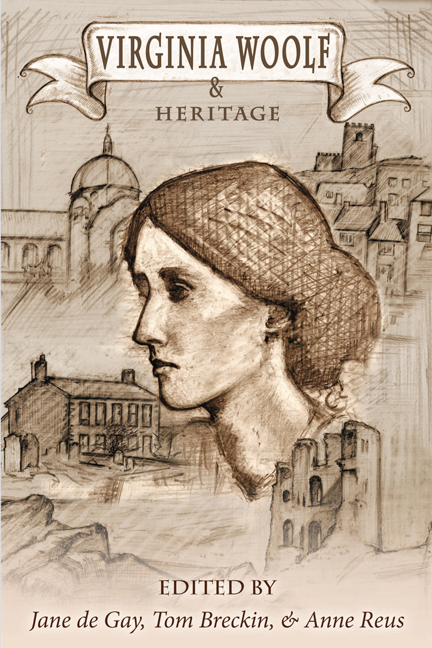Book contents
- Frontmatter
- Contents
- Introduction
- List of Abbreviations
- HERITAGE: A DEBATE
- HERITAGE, EDUCATION, AND MENTORING
- HERITAGE SPACES
- LITERARY AND CULTURAL HERITAGES
- QUEER PASTS
- MODERNISM AND HERITAGE
- Resetting the Type: An Exploration of the Historical Sense in Mrs. Dalloway
- Kenya Colony and the Kenya Novel: The East African Heritage of “A Very Fine Negress” in A Room of One's Own
- Leonard Woolf 's Fear and Politics: A Debate at the Zoo: Satirical Heritage as Apocalyptic Prophecy
- Virginia Woolf and the War on Books: Cultural Heritage and Dis-Heritage in the 1930s
- Gender Roles and the War Machine: An Undergraduate Roundtable on Virginia Woolf 's Legacies
- WRITING LIVES AND HISTORIES
- WOOLF'S LEGACIES
- FINALE
- Notes on Contributors
Gender Roles and the War Machine: An Undergraduate Roundtable on Virginia Woolf 's Legacies
from MODERNISM AND HERITAGE
- Frontmatter
- Contents
- Introduction
- List of Abbreviations
- HERITAGE: A DEBATE
- HERITAGE, EDUCATION, AND MENTORING
- HERITAGE SPACES
- LITERARY AND CULTURAL HERITAGES
- QUEER PASTS
- MODERNISM AND HERITAGE
- Resetting the Type: An Exploration of the Historical Sense in Mrs. Dalloway
- Kenya Colony and the Kenya Novel: The East African Heritage of “A Very Fine Negress” in A Room of One's Own
- Leonard Woolf 's Fear and Politics: A Debate at the Zoo: Satirical Heritage as Apocalyptic Prophecy
- Virginia Woolf and the War on Books: Cultural Heritage and Dis-Heritage in the 1930s
- Gender Roles and the War Machine: An Undergraduate Roundtable on Virginia Woolf 's Legacies
- WRITING LIVES AND HISTORIES
- WOOLF'S LEGACIES
- FINALE
- Notes on Contributors
Summary
Today, we want to reconsider heritage by investigating the ways it relates to past and present definitions of human life. We will begin by analyzing how war changed the definition of life and shifted the emphasis from maternal authority to infant welfare. With a blend of history, theory, and literature, we will demonstrate how a changing definition not only affected the ways in which both men and women were governed, but determines how our society will be managed. Our paper demonstrates the ways Virginia Woolf's Three Guineas represents a heritage that pays attention to the history of women, specifically to aspects of culture that have previously been ignored.
Woolf constructs heritage in Three Guineas around the history of women's loss of authority over their bodies and around the rising emphasis on fetal life. Viewed through the lens of biopolitics, Virginia Woolf's Three Guineas presents an inextricable link between reproduction and war aggression. Stephen Barber uses ideas of feminism with Michel Foucault's biopolitics to help us understand the tie between patriarchal constructs and warfare. Culture takes control over the individual body and manipulates it to be both forceful and docile. The regulation of the body, Foucault's second notion, focuses more on how we work to improve the population and to control life as a whole, such as socially encouraging women to stay in the home and continue to populate the country. With such insights, we can see how Three Guineas articulates how culture disciplines and regulates bodies to serve as weapons.
Biopolitics has been used extensively to study a variety of things from concepts of social immunity to sexual behavior, as well as pointing out the connections between literature and biopolitics (see, for example, Olin-Hitt). However, almost no attention has been devoted to biopolitics in regards to disciplining the maternal and fetal body. Before we turn to Woolf, we will first briefly outline how definitions of maternal and fetal life changed in those pivotal years from the end of the nineteenth century to the beginning of the twentieth century. The history reveals an entire redefinition of infant and maternal life that leads to both the aggressive domestic and war-driven international society that Woolf so thoroughly rejects in Three Guineas.
- Type
- Chapter
- Information
- Virginia Woolf and Heritage , pp. 183 - 188Publisher: Liverpool University PressPrint publication year: 2017



